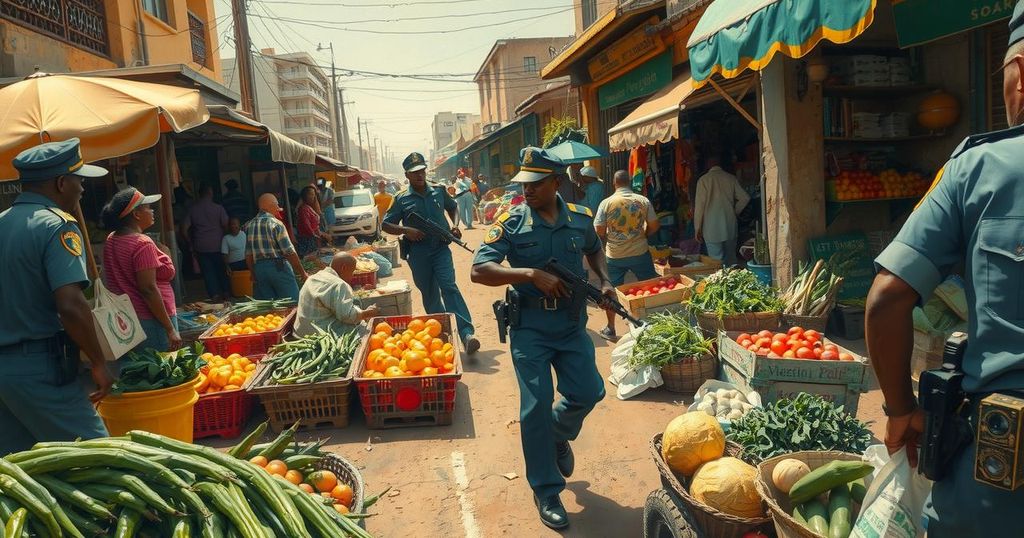Why Are Zimbabwe Police Chasing Off Some of the Economy’s Biggest Players?
In Harare, considerable crackdowns on informal vendors by municipal police have raised concerns about resource allocation and the treatment of an essential part of the economy, which sustains over 80% of the population. Critics call for supportive policies instead of aggressive tactics, emphasizing that these vendors play a crucial role amid economic struggles. The significant costs of enforcement versus the limited income of the city raise serious questions about priorities.
In Harare, Zimbabwe, the municipal police’s routine crackdowns on informal vendors have been relentless. Often, these vendors are caught off guard. Law enforcement, sometimes in plain clothes, infiltrates the bustling crowds, leading to chaos as vendors hurriedly gather their scattered goods. For vendors like Saul Nhema, who previously worked as a construction worker, these assaults mean losing their stock permanently. Nhema laments, “They have no mercy at all. Once they take your stock, you’ll never get it back.”
The Harare City Council has engaged in these aggressive measures for years, claiming they must enforce city laws against illegal vending, littering, and related health issues. However, the recent resurgence of these operations, often involving substantial police presence, raises eyebrows. Critics argue that with limited resources already stretched thin, the government misses the point while failing to provide fundamental services to residents, like access to clean drinking water.
In 2024, the council’s revenue was a mere US$3 million. In stark contrast, the costs of policing efforts have surged to over US$24 million, eight times the council’s total income. A year later, a specialized police unit aimed at vendors was created, exacerbating the fiscal strain on an already troubled budget.
The burden of this financial mismanagement appears to be falling heavily on the central government, now tasked with picking up the pieces. Zvikomborero Guvheya and Nhema illustrate just how vital informal vendors are to Zimbabwe’s strained economy, even as they face risks including eviction and extortion from law enforcement agencies.
Despite repeated attempts to secure an interview with the mayor, the Global Press Journal did not receive a response. Reuben Akili, the director of the Combined Harare Residents Association, criticized the justification for the new police unit. He points out that resources spent on enforcement could have been redirected to vital infrastructure improvements, such as establishing clean public markets or restrooms. “If we examine the funds allocated for enforcement, those resources could have been redirected toward rehabilitating markets or public restrooms in the city,” he explains.
With over 80% of Zimbabwe’s population relying on the informal sector, which contributes nearly 72% to the national GDP, these vendors are indispensable. Yet, even as they support the economy, they confront a landscape that often treats them like nuisances. Akili notes that the ongoing effort to dismantle informal trading will only lead to increased taxpayer burdens and greater economic distress.
Although there are designated vending spaces in the central business district, many vendors understandably avoid these, finding the costs for renting stalls and acquiring formal licenses—ranging from US$400 to US$800 a year—prohibitive in a struggling economy. Samuel Wadzai, involved with the Vendors Initiative for Social and Economic Transformation, emphasizes the importance of finding a compromise.
He mentions, “Raids haven’t been effective, not even when a former minister of local government requested deployment of the army to push out vendors.” The lack of positive change speaks volumes about the punitive approach currently taken.
Even when the law enforcement evicts them, vendors like Jesman Guvheya, who sells wares to support her family, often have to resort to bribing police officers to continue their work. “But there can be three or four groups that move at different times per day and you may end up paying 4 US dollars to avoid being raided,” she explains. Unfortunately, this bribe does not guarantee safety; police can still confiscate goods regardless of payments made ahead of time.
Guvheya’s experience on a recent day reveals the harsh realities she faces. While she avoided arrest, her son was not as fortunate, emphasizing the harsh and unpredictable environment in which these vendors operate.
Overall, the struggles of Zimbabwe’s informal vendors underscore a pressing need for more supportive policies—rather than heavy-handed policing—to facilitate their contributions to an economy in distress.
The aggressive targeting of informal vendors in Harare, led by the municipal police, has ignited concerns about wasteful spending amid a struggling economy. With over 80% of Zimbabwe’s population depending on this sector, critics urge the need for supporting infrastructure rather than punitive measures. The financial implications of enforcing such crackdowns are alarming and highlight the failure of authorities to support essential livelihoods while ensuring urban order. A reevaluation of the approach taken by local government is essential for the survival of these vendors and the economy as a whole.
Original Source: www.thezimbabwean.co




Post Comment